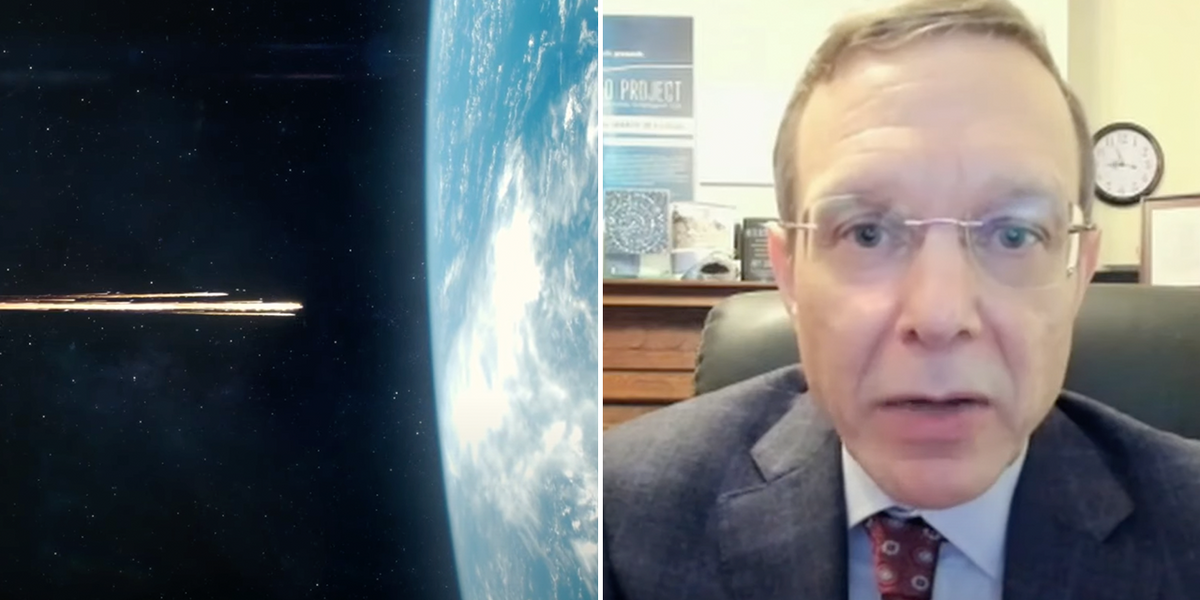Harvard Astrophysicist Avi Loeb’s Shocking UFO Discoveries
In a recent interview on GB News with Patrick Christys, Harvard astrophysicist Avi Loeb shared two astonishing discoveries regarding unidentified flying objects (UFOs) that challenge our understanding of the cosmos. Loeb, known for his bold theories and research into extraterrestrial phenomena, discussed these findings that he believes may hint at the existence of intelligent, non-human life.
The Mysterious Oumuamua
One of the most intriguing objects that Loeb discussed is ‘Oumuamua,’ which was discovered by astronomers in 2017. This interstellar object, measuring approximately the size of a football field, passed near Earth and exhibited some peculiar characteristics that have left scientists scratching their heads.
Loeb described Oumuamua as having a flat, pancake-like shape, which was inferred from the way it reflected sunlight. However, what truly baffled researchers was how it was propelled away from the sun by a force that could not be explained by conventional cometary behavior. Unlike typical comets that exhibit a tail due to the sublimation of ice, Oumuamua’s trajectory and acceleration suggested something more enigmatic at play.
Loeb posits that the unusual properties of Oumuamua could indicate that it is not merely a natural celestial object but potentially a probe or artifact from an advanced civilization. This theory, while controversial, has sparked significant debate within the scientific community.
The Meteoric Collision
In addition to Oumuamua, Loeb revealed another striking discovery: an object that collided with Earth years prior. This object, roughly the size of a person, was traveling at an astonishing speed—faster than 95% of the stars in our vicinity. Upon entering the Earth’s atmosphere, it exploded as a meteor, leaving behind a trail of intrigue.
Loeb led an expedition to the Pacific Ocean, where U.S. government satellites had detected a fireball from this meteor. The team collected materials from the ocean floor, and to their astonishment, they found that 10% of the collected samples contained a composition never before identified in our solar system. This finding raises questions about the origins of the object and whether it could be space debris from an advanced civilization.
The Implications of Intelligent Life
During the interview, Patrick Christys suggested that Loeb’s findings could imply the existence of intelligent probes sent by extraterrestrial civilizations. Loeb elaborated on this idea, noting that humanity has also sent probes into interstellar space. However, these probes would take tens of thousands of years to exit the solar system, and once they do, they become space junk, potentially colliding with other celestial bodies, including Earth.
He referenced the Tesla Roadster launched by Elon Musk in 2018, which is now on an elliptical orbit around the sun and may one day collide with Earth in 20 million years. This raises the possibility that other civilizations might have sent similar probes, which could eventually intersect with our planet.
The Future of Exploration
Loeb’s discoveries have opened the door to further exploration and research. He expressed hope for another expedition to the Pacific Ocean to search for larger pieces of the meteor that could provide more insight into its origins and composition. Such endeavors could help us understand not only the nature of these mysterious objects but also the broader implications for life beyond Earth.
Conclusion
Avi Loeb’s revelations about Oumuamua and the meteor that collided with Earth challenge our understanding of the universe and the potential for intelligent life beyond our planet. As he continues to investigate these phenomena, the scientific community and the public alike are left to ponder the possibilities that lie beyond our solar system. Whether these discoveries will lead to concrete evidence of extraterrestrial intelligence remains to be seen, but they undoubtedly spark curiosity and excitement about the mysteries of the cosmos.
